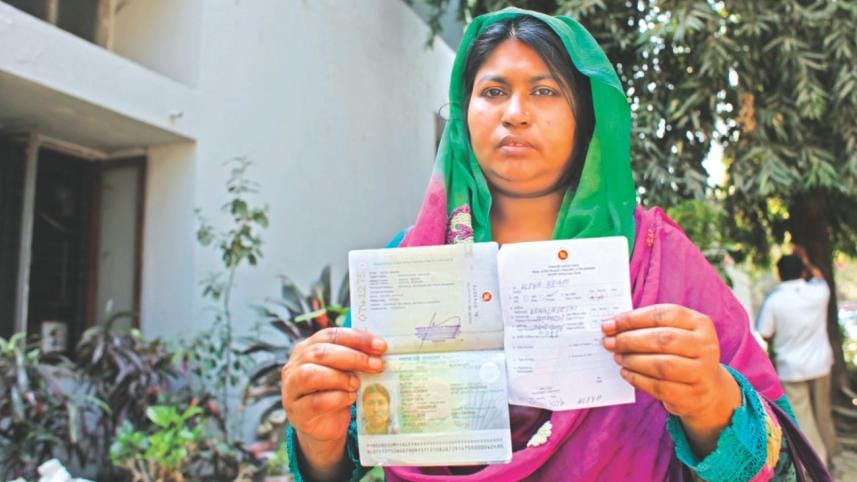The plight of Aleya

Aleya Begum was happy to get a job as a domestic help at a police official's house in Saudi Arabia.
The poor woman from Faridpur wanted desperately to support her four-member family and start treatment for her son, who is physically challenged, as her rickshaw-puller husband could barely make ends meet with his meagre income.
“My husband's income is very poor. So I had to make a tough decision to go abroad to support our family and for a better future of our children,” Aleya said while talking to this correspondent in Dhaka on February 28.
And when she finally got the job in the gulf state, she started dreaming of better days.
“I was very happy to get the job in a police official's home. I thought my children's future would change.”
But her happiness didn't last long. Soon she started facing troubles.
“They [agents in Saudi Arabia] started mounting pressure on me to leave my job. They wanted me to do 'bad jobs' for them,” Aleya alleged. “They also assaulted me physically for several days as I refused their 'offer'.”
Aleya then contacted her husband and told him everything. He asked her to return home.
“We are poor. We need money for our family and children. But we cannot destroy our honour,” said Kayem Molla, Aleya's husband.
Kayem contacted the local agent in Dhaka and finalised the procedures for his wife's return.
She came back home empty-handed on February 26, with nothing but a harrowing experience.
Aleya went to Saudi Arabia on December 8 last year. She and her husband contacted a local broker who assured them of free work visa to the Kingdom.
She decided to go to the Middle East country as she came to know that the process of sending her husband there was very costly and a complicated one.
Aleya went there through Fatema Employment Services in the capital's Kakrail.
Contacted, Jahurul Islam, proprietor of Fatema Employment Services, refuted the allegation of physical torture on Aleya and claimed that she herself wanted to return home due to her illness.
Around 1,000 women came back home from Saudi Arabia on various grounds until February this year.
Besides, hundred other families have submitted written applications to the Bureau of Manpower Employment and Training (BMET) and Wage Earners Welfare Board (WEWB) in the last few months, asking them to bring back their relatives from Saudi Arabia.
Rokeya Begum, another poor housewife from Sherpur, went there on April 25 last year. She was also happy to find her Saudi employer to be a good person. But things started to change the very next month when her employer began torturing her.
“The torture by the employer and his family members on my mother started to increase day by day. In the beginning, she could contact us. But soon she was not allowed to talk to us,” alleged Rafikul Islam, son of the victim, in a written complaint to the WEWB on November 27.
Officials at the Bangladesh missions in Riyadh and Jeddah said more than 400 female migrants were now staying at separate safe houses after leaving their employers on allegations of abuses and illness.
The allegations are “common”, claimed Sarwar Alam, counsellor (labour) at the Bangladesh Embassy in Riyadh.
“Very few female workers at the safe homes go back to their employers' houses. Majority of them want to return home,” he told The Daily Star.
Contacted, Jabed Ahmed, additional secretary to the expatriates' welfare ministry, said it is not possible to force any woman to work if she is not interested.
Around 85,000 Bangladeshi females have been working in Saudi Arabia as domestic help since April 2015, according to statistics of the BMET.



 For all latest news, follow The Daily Star's Google News channel.
For all latest news, follow The Daily Star's Google News channel.
Comments